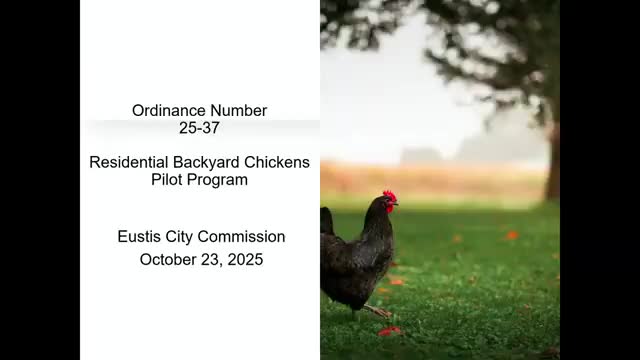Eustis adopts two-year backyard chickens pilot program; 15 permits limited citywide
Get AI-powered insights, summaries, and transcripts
Subscribe
Summary
The Eustis City Commission approved a two-year pilot allowing up to three hens per household for up to 15 single-family properties, with training, setbacks and a permit/renewal regime; the ordinance passed 3-2 after public debate over health, enforcement and neighborhood impacts.
The City Commission of the City of Eustis on Oct. 23 approved an ordinance establishing a two-year pilot program to allow residential backyard chickens on up to 15 single-family lots citywide.
The ordinance, adopted on first reading, permits up to three hens per qualifying lot (no roosters), requires applicants to complete a University of Florida/IFAS chicken-keeping course, and creates a permit and annual renewal system. The city set initial application and renewal fees at $75 and $25, respectively. The measure passed on a 3-2 vote: Commissioners Hasbati (aye), Ashcraft (aye) and Mayor Hawkins (aye); Commissioners Holland and Lee opposed.
Staff presented the ordinance as a limited, data-driven pilot intended to balance sustainability, education and food resilience with neighborhood compatibility. “The duration right now will be a 2 year pilot,” the presenter stated, and staff said participation would be capped at 15 properties so the city could track complaints, staff hours and administrative costs.
The ordinance sets basic standards and enforcement steps. Structural requirements include rear-yard coops only (no street-front placement), a minimum five-foot setback from property lines, 20 feet from adjacent dwellings, a coop size limit of 100 square feet and a six-foot maximum height. Hens must have at least four square feet inside the coop and five square feet in the run; predator-resistant materials are required and chicken wire is expressly forbidden. Sanitation rules require feed stored in rodent-proof containers and odor thresholds that would trigger enforcement if an odor persists for 15 consecutive minutes in an hour. The permit is suspended if a homeowner refuses inspection; repeated verified complaints can lead to fines ($100 first violation; $250 second) and revocation.
Opponents at the meeting raised public-health and nuisance concerns. “I have a real concern, for health reasons,” resident Pam Rivas told the commission during public input, pointing to smaller urban lots and potential attraction of rodents and predators. Commissioner Holland said he opposed the measure from the start and worried about enforcement workloads for code officers. Supporters — including residents and a commission member who said the ordinance was “well written” — urged the limited, educational approach and noted other Central Florida cities have similar rules.
Staff said the program includes data points and a formal review: if the city receives five verified complaints within any 12-month period staff will present an interim status report; otherwise staff will prepare a program evaluation 90 days before the two-year pilot expires. The ordinance allows the commission to repeal or amend the pilot earlier if needed.
The ordinance also authorizes the city manager to suspend permits in the event of a poultry health advisory, such as an avian influenza concern, and requires applicants to attest that they will comply with any homeowner-association, deed or lease restrictions (those private covenants take precedence). The ordinance prohibits slaughter and burial on site and forbids sale or distribution of eggs; eggs are limited to household consumption.
The commission approved the ordinance on first reading with the stated goal of testing the policy on a limited basis and returning with measured data for any permanent policy changes.
